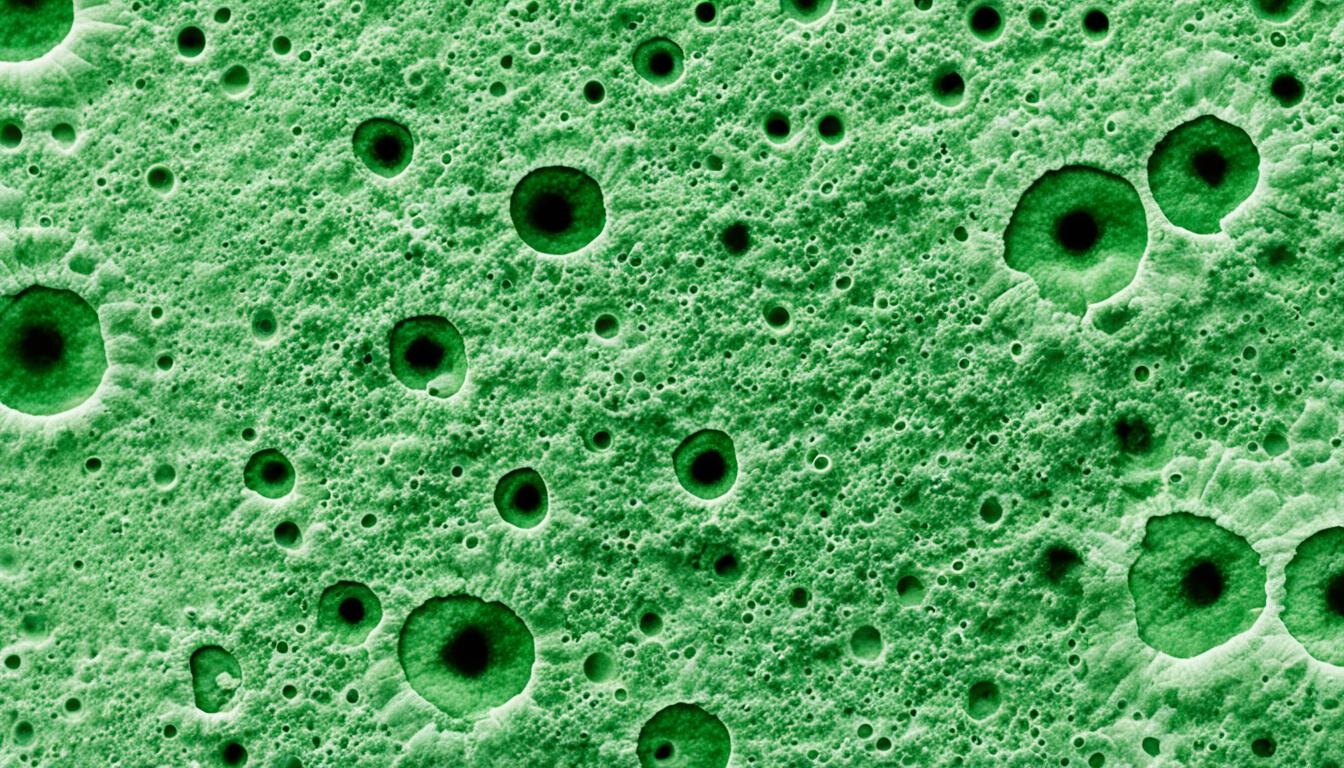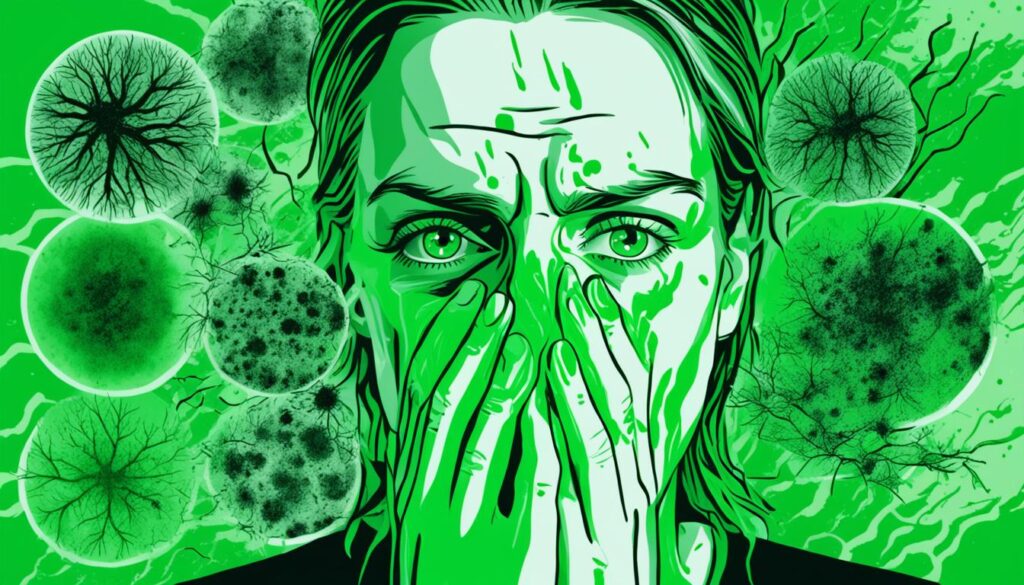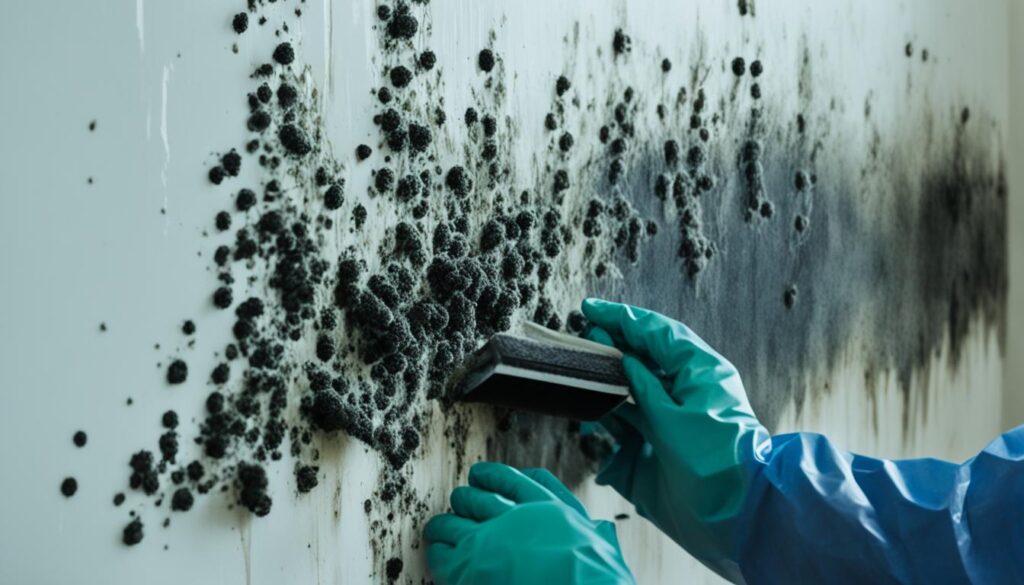
Black Mold Poisoning Symptoms Explained
Black mold poisoning can have serious health implications. Understanding the symptoms associated with black mold poisoning is essential for prompt identification and treatment. In this section, we will discuss the various symptoms that may indicate black mold poisoning. By familiarizing yourself with these warning signs, you can take the necessary steps to protect your health and well-being.
Key Takeaways:
- Black mold poisoning symptoms should not be ignored and require immediate attention.
- Common symptoms include allergic reactions, respiratory issues, and neurological problems.
- If you suspect black mold poisoning, seek medical assistance and consider professional mold remediation services.
- Preventing black mold growth and addressing any moisture issues in your environment can help reduce the risk of exposure.
- Regularly inspecting your home or workspace for signs of black mold is essential for early detection and prevention.
Identifying Black Mold Poisoning Symptoms
In this section, we will delve into the specific symptoms that may indicate black mold poisoning. It is crucial to be aware of these warning signs as they can help you determine whether you have been exposed to black mold and need to take necessary steps to address the situation.
Listed below are some common symptoms that may occur due to black mold poisoning:
- Respiratory issues: Black mold exposure can lead to respiratory problems such as coughing, wheezing, shortness of breath, and asthma-like symptoms. If you experience these symptoms, it is important to consider the possibility of black mold poisoning.
- Allergic reactions: Many individuals develop allergic reactions to black mold, including sneezing, runny nose, itchy or watery eyes, and skin rashes. These symptoms can manifest shortly after exposure.
- Neurological symptoms: Black mold exposure has been linked to neurological symptoms such as headaches, dizziness, difficulty concentrating, memory problems, and even changes in mood or behavior.
- Fatigue and weakness: Chronic fatigue and weakness are common symptoms experienced by individuals exposed to black mold for prolonged periods.
- Digestive issues: Black mold poisoning can affect the digestive system, causing symptoms like nausea, vomiting, diarrhea, and abdominal pain.
In some cases, black mold poisoning can also lead to more severe symptoms, especially in individuals with weakened immune systems or existing respiratory conditions. It is crucial to monitor your health and seek medical attention if you experience any of these symptoms after being exposed to black mold.
Remember, identifying these symptoms is the first step in addressing black mold poisoning. If you suspect black mold exposure, it is advisable to consult with a professional mold inspector or healthcare provider for proper diagnosis and treatment.
Symptoms of Black Mold Poisoning
| Symptom | Description |
|---|---|
| Respiratory issues | Coughing, wheezing, shortness of breath, and asthma-like symptoms |
| Allergic reactions | Sneezing, runny nose, itchy or watery eyes, and skin rashes |
| Neurological symptoms | Headaches, dizziness, difficulty concentrating, memory problems, and changes in mood or behavior |
| Fatigue and weakness | Chronic tiredness and weakness |
| Digestive issues | Nausea, vomiting, diarrhea, and abdominal pain |
Recognizing these symptoms can help you take the necessary precautions to protect yourself and your loved ones from the potential dangers of black mold poisoning.

Addressing Black Mold Exposure Risks
Black mold exposure can pose serious risks to your health and the well-being of your loved ones. It is important to take proactive measures to address this issue and create a safe living environment. In this section, we will explore effective ways to address black mold exposure risks and protect yourself from its harmful effects.
Prevention Methods
Prevention is key when it comes to black mold. By following these simple steps, you can significantly reduce the chances of mold growth in your home:
- Keep humidity levels in check by using dehumidifiers or air conditioners.
- Fix any water leaks or plumbing issues promptly to prevent moisture buildup.
- Ensure proper ventilation in your home by opening windows or using exhaust fans.
- Regularly clean and maintain areas prone to moisture, such as bathrooms and basements.
- Use mold-resistant products when renovating or constructing your home.
Remediation Techniques
If you suspect or have identified black mold growth in your home, it is crucial to address the problem promptly. Professional mold remediation services can help remove and prevent the spread of mold, ensuring a safe environment. Consider the following remediation techniques:
- Identify the source of moisture and eliminate it.
- Contain the affected area to prevent mold spores from spreading.
- Remove and dispose of mold-infested materials properly.
- Clean and disinfect surfaces thoroughly.
- Implement preventive measures to avoid future mold growth.
Remember, proper black mold remediation requires expertise and specialized equipment. It is best to seek professional help to ensure a thorough and effective process.
By addressing black mold exposure risks through prevention and remediation, you can safeguard your health and create a mold-free environment. It’s essential to be proactive and take action if you suspect black mold growth in your home.
| Signs of Black Mold Exposure | Addressing Risks |
|---|---|
| Respiratory issues | Prevent moisture buildup by fixing leaks promptly. |
| Allergic reactions | Use dehumidifiers to control humidity levels. |
| Headaches and fatigue | Ensure proper ventilation in your home. |
| Skin irritation and rashes | Clean and maintain areas prone to moisture. |
| Worsening of respiratory conditions | Hire professional mold remediation services for thorough removal. |

By taking these necessary precautions and addressing black mold exposure risks, you can protect yourself and your family from the potential health hazards associated with black mold. Remember, prevention and prompt action are key when it comes to dealing with mold. Stay vigilant and prioritize your well-being.
Conclusion
In conclusion, understanding the symptoms of black mold poisoning is crucial for protecting your health. Exposure to black mold can lead to a range of health issues, including respiratory problems, allergies, and even neurological symptoms. By recognizing these symptoms, you can take appropriate action to address the situation and create a safe living environment.
If you suspect that you have been exposed to black mold or are experiencing any of the associated symptoms, it is important to seek professional help. Fix Mold Miami is a trusted name in the industry, offering expert assistance and mold assessments to ensure your home is free from mold. Their team of professionals can identify the presence of black mold, provide remediation solutions, and help you create a healthier living space.
Don’t hesitate to reach out to Fix Mold Miami at 305-465-6653 to schedule a mold assessment and get the expert guidance you need. Protect your health and the well-being of your loved ones by taking action against black mold.




